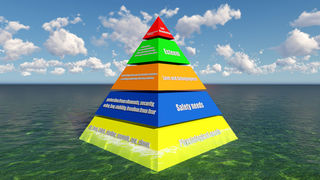Altruism
Why Maslow's Self-Actualization Theory Is Not Quite Right
Having all needs met and living with little suffering may stifle growth.
Posted May 24, 2018 Reviewed by Ekua Hagan

Since the 1950s, college students have studied the psychological speculations of Abraham Maslow, absorbed the ideas of "self-actualization," and likely inhaled the message as true because of the efforts in memorizing the hierarchy and trying to pass mid-term exams.
The gist of his story, described in detail in his 1954 book, Motivation and Personality, is this: People are motivated to pursue different needs at different points in their development.
The basic issue is what he calls the physiological, in which one's needs for survival must be met.
The second issue is safety needs. These can take the form of an infant's healthy attachment to the mother, having enough money in the bank to be secure, and having a degree of physical health.
Social belonging is next, characterized by a need for harmony in one's family, friendships, and community relationships. Peace in one's environment is the key.
The fourth point on the pyramid is the need to be esteemed, to be recognized by others, and have one's ego not be threatened by disrespect or an unjust lack of recognition.
The top of the hierarchy, only made possible if the other motivational issues are met and mastered, is self-actualization. This includes the need to be creative, spontaneous, and to try to be one's best self. A person now is free to achieve one's own stated desires. An athlete is free to be the best on the team, a parent is free to become the very best parent to the children, the business-minded person is free to build the company based on the vision of what this company should be.
Later in his career, Maslow discussed a sixth point in the hierarchy: transcendence, in which self-giving is paramount. This includes the quest to know the spiritual dimension of life on earth and beyond.
As the philosopher Leonard Geller points out, the impetus for these growth needs resides within the person ("The Failure of Self-Actualization Theory," 1982). It is the person who strives for greater mastery of each need.
On the other hand, when the needs are frustrated, it is the environment that is to blame because circumstances and other people are what blocks the developing person, creating what is called "deficit needs," or the motivation to be free from the frustration or even hatred.
The deficit needs, in other words, are in the hands of other people, not within the developing person. Yet, even when the deficit needs are met (overcoming hunger or low wage, for example), many people, especially in the West, suffer from "anomie, alienation, boredom, apathy, resignation, cynicism, joylessness, meaningless, and despair" (Geller, 1982, p.64).
It is striking for Maslow's theory that First World countries, where so many people's basic needs are met, experience considerably higher divorce rates. Within the United States, it is those with more money and a more stable economic situation who have higher suicide rates than those from the lower socio-economic strata.
Furthermore, it is estimated that the suicide rate is twice as high in Caucasian than minority communities in the U.S. Narcissism is growing in the West, where basic needs are more obviously met (Twenge & Campbell, 2010). The lack of transcendence or the abandonment of religious faith is especially prominent in Europe, a world area with a high standard of living. "The Great Decline" in religious sentiment (attendance at worship services, membership in religious organizations, prayers, and feelings of religiosity) within the United Stated is steep from 1952 to 2012.
One would think that just the opposite would occur if Maslow's story of development were valid, including peaceful marriages, less despair, reaching out to others, and transcendence within cultures and socio-economic strata in which physiological and safety needs are met. Well-fed people with money in the bank and pats on the back, in theory, should be striving more for creativity, altruism, self-transcendence, and serving others who struggle with these needs.
Given that so many people in the West (and not in the lower social classes there) with basic needs met are still bored, entitled, frustrated, despairing, and not necessarily seeking transcendence, perhaps there is a need for re-thinking Maslow's model of needs. I would like to suggest the following:
The challenges of life, when in the form of injustices from other people, can stifle growth, as Maslow suggests. Yet, the suffering that results from other people's injustices can be a signal to internally confront the **effects** of the traumatic injustices.
As one treated unjustly suffers and then experiences deep resentments, hatred, discouragement, anxiety, depression, and all else that can hamper development, the suffering person– internally–can respond by:
- Finding meaning in the suffering
- Forgiving those who caused the suffering
- With courage, bear the pain of the suffering so that it is not passed to others in deliberate cruelty through displacement, false accusations through projection, or any other way.
External traumas and the resultant suffering, then, become causes for human growth.
Perhaps this suffering, when it comes and is used internally for growth, is a necessary part of advancing in the maturity that Maslow first described as self-actualizing and self-transcending.
So that I am not misunderstood, I am not advocating that people go out and seek suffering. Instead, I am suggesting that as people suffer, as their deficit needs are not being met, they have the potential to develop a sense of the virtues of humility (which can lead to transcendence), courage (which can lead to a quest for justice for self and others), forgiveness (which can lead to a quest to help others), and then actually caring for others (which can lead to a quest to serve others so that they have a chance to grow).
In other words, it is not only the environment that frustrates further human growth but also our internal reactions to the environmental challenges. How we respond to the suffering, internally and not just behaviorally, may make all the difference in our lives.
This idea is in strong contrast to Maslow in two ways. First, as discussed above, environmental challenges and the resulting suffering are not the keys to stalled growth as a person, but instead, our internal response to that suffering ultimately is more important.
Second, when basic needs are met and there are few major environmental challenges that produce suffering, then growth toward transcendence may stop. A full belly, a comfortable lounge chair, and one's favorite sports team playing on the large, flat-screen television may not be the impetus to true growth in transcending the self toward the quest for truth, goodness, and beauty, but instead to a pattern of "pass the chips and the rest of the world be ignored!"
Is there a need to love when one is feeling so satisfied? Is there a need to see if there is a God if one's physical needs are almost fully met? Is there a need to not continue dominating others when the path is open to so dominate, especially if one feels esteemed in the domination?
A revised sequence of the growth hierarchy may look something like this:
First, basic needs are met so that one is not starving, as Maslow describes. Yet, there need not be a quest for mastery here, so that one is not stuck in seeking more and more… and more of the basics.
Second, one has a degree of safety, as Maslow describes. Again, temperance is needed so that the quest for mastery does not include, as ends in and of themselves, the quest for the ever-larger house or bank account. More is not always better in the sense of one's developing toward a more advanced humanity.
Third, one learns to be civil and respectful in light of existing norms. One has a sense of belonging, as Maslow describes. This can be expanded beyond Maslow to including assisting others in experiencing belonging. The quest to belong does not have to center only on the self. This, then, would be importantly transitional to the next step in the hierarchy.
Fourth, one then does not quest after esteem, which can lead to self-absorption and narcissism. Instead, it is here that the growth mechanism of suffering can, and often does, enter a person's world in childhood or adolescence when there is external trauma. It is here that the person needs to find the way forward through the suffering with the internal developments of the (what the world considers to be) lowly virtues of humility and forgiveness, and the revered virtue of courage.
The developmental implications need to be made very clear: On this fourth level, unless one finds the right ways of confronting the injustices of life and the resulting suffering and resentment, then further growth in one's humanity might not occur.
Fifth, from the lowly virtues, develop love: the genuine desire to serve others for their sake, not for one's own sake. The potato chips, the large television, and the comfy chair then become secondary needs, far below the primary needs to make a difference in this life for others, to have a specific purpose to love, even if the path to all of this is wonderfully different across people, cultures, and time. The end-point of human existence as love has been discussed from biological, philosophical, and psychological perspectives in Enright (2012).
It seems to me that Maslow's path, especially the esteem marker, needs reconstruction and we see it in the West's current struggle against narcissism and meaninglessness. We can learn a lot from those who struggle with the basics of life and yet rise to make a difference because suffering, and the healthy response to suffering, have matured them.
Frankl's Logotherapy (finding meaning in suffering), Forgiveness Therapy (reducing rage and resentment, avoiding dominance, and learning humility, courage, and love), and the examination of altruism as a life's goal are paths that need greater attention, especially when basic needs are met and traumatic injustices occur with their concomitant resentment and rage, threatening the potential of what humanity can become.
References
Enright, R.D. (2012). The forgiving life. Washington, DC: American Psychological Association.
Geller, L. (1982). The failure of self-actualization theory. Journal of Humanistic Psychology, 22.
Twenge, J.M. & Campbell, W.K. (2010). The narcissism epidemic. New York: Atria Books.




